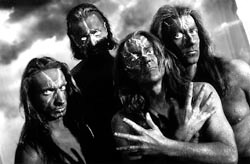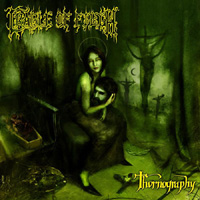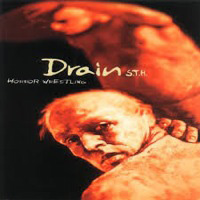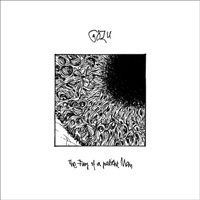 Gamma Ray
Gamma Ray
PowerPlant (Noise)
An interview with vocalist/guitarist Kai Hansen
by Scott Hefflon
Powerplant, aside from being a great album, is the best sounding record you’ve ever done.
I think it’s clearer and more compact, one might say. We tried to mix so that each part – all the guitars, bass, drums, and all the additional fills and layers of vocals – was more in the background. All the guitar overdubs, keyboards and choir voices are more subtle.
The main vocal melody is now the focus, whereas on the older records – including the first few Helloween records – it seemed everything was equally upfront.
Yes, we’re quite satisfied with the way it’s come out. Then again, every artist thinks their most recent work is their best.
You and drummer Dan Zimmermann are also in Iron Savior with Blind Guardian producer Piet Sielck. Iron Savior has a new CD as well, so you essentially have two new records out.
The Iron Savior record has been out for a few months, but so far the only problem it’s caused is that I couldn’t go on tour in January with Iron Savior because I was in the studio with Gamma Ray.
How did they tour without you?
They just played without me. They had one guitar, bass, keyboards, and drums. It seemed to work pretty well.
I thought the duel guitars, the intertwining fills and leads, was kinda the whole point…
Not the whole point, in the end it’s the songs that count. It’s nice to have the two guitars going on, and some songs just aren’t the same, but it’s the live energy that’s important.
You must be pretty busy on stage, seeing as you’re lead vocalist and lead guitarist.
Not much time to relax, except during the bass and drum solos. I sometimes don’t even have time to have a quick drink of water, because if there is a quick break between songs, I kind of have to say something.
As a little history lesson, which Helloween albums did you sing on and on which did you just play guitar?
I sang on the first mini-LP, Helloween, and I sang on Walls of Jericho. Then I sang on a maxi-single called “Judas” with some live tracks. After that, there was Keeper of the Seven Keys, part one and two, where Michael (Kinske) took over vocals. He stayed two records after I left, Pick Bubbles Go Ape and Chameleon. Actually, the mini-LP is now on the CD version of Walls of Jericho.
You’re also on The Best, The Rest, The Rare, right?
Yes.
You sang one of my favorite pre-Keeper… songs, “Heavy Metal is the Law,” and I notice you have a song on your new record, “Heavy Metal Universe,” which sounds a lot like “The Gods Made Heavy Metal” and Manowar in general.
That was written last May or so, not while we were on tour with Manowar, as many people think. I had the chorus in mind, and when we started to record it, it was going so much in that direction, we just did it that way. It’s not that we weren’t going to do it because it sounded like Manowar, because I don’t think they’re the only ones who can say “heavy metal.” This song lives on the clichés of heavy metal, and I think that’s the good thing about it. That’s the stuff I like in heavy metal, so why not celebrate it?
The clichés of heavy metal are enjoyable to you? They don’t make your skin crawl just a little? They don’t cause you any embarrassment?
No, absolutely not, I enjoy them. That’s part of what heavy metal is all about. I grew up on it and I still enjoy it. I know in the states it may be uncool for people to say they like heavy metal, or even worse, to play heavy metal.
We’ll come up with any synonym we can so we don’t have to call it heavy metal.
I don’t agree with that. There was a trend in Germany from ’92 to ’94 or so where the same thing happened. Every band that played heavy metal was trying to find a new way to explain what they played without calling it heavy metal. It was so silly because in the end it is heavy metal – so fuckin’ what? But the trend has changed again, and now it’s acceptable and cool to like heavy metal.
Originally, I was trying to call it “new powermetal” or something, but it’s really intricate, crisply-produced, traditional heavy metal.
It’s classic. It has some new aspects and influences, but it’s not like I’m trying to reinvent music or create a new style, because nothing is really new. What it comes down to is does the band have good songs? No matter what style of music, is the song good? Is it played well? Is it sung well? Does it kick your ass or move you in some way? It’s not about reinventing music, it’s about is it fun to listen to, is it fun to play?
 You’ve always been into layering guitars and vocals, and something I notice – more on Iron Savior perhaps – is the influence of Queen’s Brian May.
You’ve always been into layering guitars and vocals, and something I notice – more on Iron Savior perhaps – is the influence of Queen’s Brian May.
I like Queen and Brian’s guitar style very much. He did some very inventive things. He may’ve been the first to do the guitar orchestration. And while I just said there’s really nothing new, sometimes there are things people just haven’t tried yet. The Beatles were probably the first to make use of multi-tracking – they did twin guitar harmonies long ago… And Lynard Skynard had three guitars playing at the same time. So the next step is for someone to pick up where they left off saying, “three guitars? Why not make it ten?” With multi-tracking, I can lay down 24 guitar tracks and make it sound like a fuckin’ orchestra. Someone has to do it, but how high can you go? It’s the same thing, and while it may sound a bit different, it’s just the next logical step. But with Brian, it’s the way he does it that’s special, even though the thing itself is not necessarily new. But it’s very special.
I wanted to ask you about your cover of The Pet Shop Boys’ “It’s a Sin” – what made you decide to do it?
We heard the song on the radio, and we weren’t really in the mood to do a cover of an ’80s heavy metal song, which seems to be quite fashionable at the moment. We wanted to do something different, something like Judas Priest did with “Diamonds and Rust.” They took a non-heavy metal song and turned it into a great metal song.
A song a lot of metalheads have never heard the original of.
It took me three years to find and hear the original. “Joan Biaz? Whatever. She was at Woodstock or something, right?” To me, that’s a Priest song, nothing else. We had the same intention with “It’s a Sin.” It’s a killer song. When I used to hear it, I felt heavy guitars and drums behind it.
Odd thing is, the original is kinda cold and mechanized, almost spooky and apathetic, then you cover it with a passionate voice and all kinds of guitar layerings… Did you originally try to cover it cold and sparse?
Actually, yes. I wasn’t sure how to sing it originally, so I tried to keep it close to the original. But I didn’t like the way it came out. It sounded wimpy, in a way. So we made it really heavy, but it didn’t sound like it came from the heart. So we gave it a rest for a few days and did it without even thinking about what we wanted it to be like, and that’s the version that’s on the record.
You mentioned bands covering ’80s metal tunes… I was pleasantly surprised Hammerfall covered Pretty Maids’ “Back to Back.” That’s a band that I really liked, but very few people list them as an inspiration or even seem to know who they are. Where are they from?
They’re from Denmark.
And Hammerfall’s from?
Sweden.
Are those two, um, close? I’m an American and I suck at geography. I can point to Europe on a map, but that’s about it…
OK, for you Americans… I’m in Germany. Germany is somewhere in the north part. And Germany has been reunited again.
I heard about that, something about a wall, right?
Right. It was divided after the war. There was just one little “island” that was West Germany, surrounded by East Germany which had Berlin, former capital and now capital again.
What other metal bands were from your area during your early days? Accept was before Helloween, right?
Yes, but it was the Scorpions who really started the German hard rock scene. They began in the early ’70s. There were other bands, but they were the most remarkable. And the first German heavy metal band that really made it anywhere was probably Accept. They came out in the very early ’80s.
I was a big fan of Restless & Wild and Balls to the Wall, which came out within six months of each other, at least in the states.
But that was later. It was Breaker that was the killer. While it wasn’t really “new” necessarily, it was a little faster, a little harder, a little more wild, and they had great songs.
“Fast and a Shark” (off Restless & Wild) was probably the fastest, most aggressive double-bass-thunder-and-duel-guitar-soloing song I’d ever heard. That, to me, was the precursor to thrash and speed metal, and when I first heard Helloween, I liked it instantly because it was like that song.
That song started something for me as well.
Why did you leave Helloween? Was that, like, ’89 or so?
’89, yeah. It took me a year from the first thought to the final decision. It was because of band affairs and internal relationships. It just wasn’t cool anymore. There was new management and the band wasn’t a union anymore and it felt like we were being pushed around… It was after the I Want Out – Live album that came out after Keeper… two.
I’ve always wondered – in Helloween, Gamma Ray, and now Iron Savior – what is it with all these keys and signs and concepts?
On which album?
All of them.
Powerplant isn’t a concept album, but some of the ten songs have connections, but that’s not really on purpose. Somewhere Out in Space (’97) and Land of the Free (’95) were concept albums. Our lyrics are a mix of science fiction and fantasy, but based on reality. It’s more entertaining to tell stories in a science fiction or fantastic way. We could have the cover be a photo of the band in our normal street clothes, but that would be pretty boring. It’s more fun to have images to dream away with while listening to the music.
So it’s more entertainment than spiritual?
It’s not religious or political, it’s fantasy and fun, but everything in the lyrics has meaning to us. If you believe in UFOs or other life forms, you can find that in our lyrics. I don’t know, but I tend to believe it, and I’m fascinated by the idea. Space may be our origin, and maybe we are the descendants of an ancient race. Maybe, I don’t know. And maybe someday we’ll have to develop the means to travel to another planet to keep our race alive.
Another thing that’s always bothered me: “Keeper of the Seven Keys” only says what the first five keys are for!
Really? I think it says what all seven keys are for… I’m not sure anymore.
You went into great detail on the first few, then rush the next couple, but you never said where the sixth and seventh keys belonged.
Maybe we’d only found the first five keys at the time. Maybe the final two keys are still missing.
What other bands do you feel a kind of kinship with?
There are quite a few: Rage, Stratovarious…
I like Stratovarious (formerly on Noise, just signed on with Nuclear Blast) because they use the keyboards as a prominent instrument, not just for dramatic chords.
Kind of the old Rainbow or Deep Purple tradition. Other bands, like Blind Guardian, are an important part of the scene.
Are you a fan of Primal Fear, seeing as Ralf (Scheepers) left Gamma Ray hoping to join Judas Priest, but formed Primal Fear instead?
I think it’s good stuff. We still talk a lot.
Just to sum up, how is Gamma Ray significantly different than Helloween?
I think it’s greatly different, but it’d be hard to put my finger on specifically why. I think Raw is their best record since Keeper… part two, but I think Gamma Ray is more aggressive and full-sounding. But that, I guess, is up to the listener.



